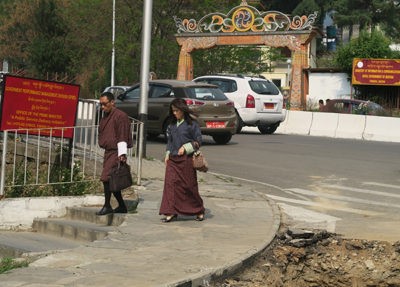– Joaquim Magalhães de Castro
The report tells us that on the day Cacela and Cabral arrived at Rintam (now Chapcha, as we have seen), there also arrived a relative of the man who had negotiated the journey in Rangamati. Immediately he agreed to lead them to Pargan (Paro), the capital of the kingdom, and to find there someone to take them to the king. And so it was. Four days later the Jesuit priests were in Paro.
This was not our destination yet. We would go there in a later moment of our journey. The first night will be spent in the present capital Thimphu, that we reach a very late at night. The accommodation, while not compromising, is far from meeting expectations. I think the mandatory 180 US dollars a day should give you something a little better. But what do I do? Why do I complain? It is enough to think of what the priests have endured, eaten by mosquitoes and bedbugs, attacked by fevers and subject to all kinds of traps and adverse meteorological conditions, and then the less positive cogitations vanish.
The well-lit façades of the monasteries-palaces and the national stadium, as well as a succession of apartments in the format of the traditional houses, but with many more floors, can be seen while we pass through the city.
Implanted at 2,350 meters of altitude, Thimphu is head, trunk and members of the country since 1961 and, as a consequence, the most populous city. Ninety thousand inhabitants. The first car would make its triumphant entry three years later, just after the completion of the road linking the Bengal plains to the capital valley, and television broadcasts would only be allowed from 1999 (almost at the same time as the internet!), gradually spreading to the rest of the country. Even today the traffic is insignificant making the annoying traffic lights unnecessary, as in North Korea’s capital Pyongyang. For now, the old signalman takes care of the task.
Most of the public offices are concentrated in Thimpu, including the National Assembly of the new parliamentary democracy. The historical speech of the old king Wangchuck pronounced in December of 2006, abdicating in favor of the son, came to put an end to more than a century of absolute monarchy. That same morning elections were announced for 2008, the year in which the first time in the country’s history the citizens were called to the polls.


 Follow
Follow


